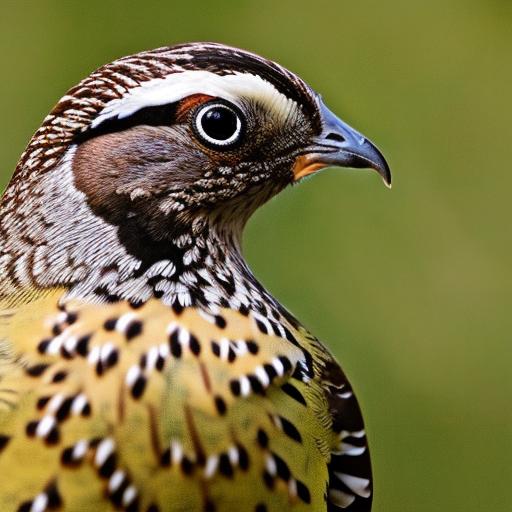Quails are small, ground-dwelling birds that are popular for their delicious eggs and flavorful meat. They are also known for their low maintenance and easy care, making them an ideal choice for beginners and experienced poultry keepers alike. Quails come in various breeds, such as the Coturnix quail, Bobwhite quail, and California quail, each with its own unique characteristics and requirements. These birds are social creatures that thrive in small flocks, making them a great addition to any backyard or homestead.
Quails are also known for their ability to adapt to different environments, making them suitable for both rural and urban settings. They are relatively quiet birds, making them a great option for those who live in areas with noise restrictions. Additionally, quails are prolific layers, with some breeds laying up to 300 eggs per year. This makes them a valuable addition to any poultry operation, providing a consistent source of fresh eggs for the household or potential income through sales. Overall, keeping quails can be a rewarding and enjoyable experience for anyone interested in poultry keeping.
Key Takeaways
- Quails are small, low-maintenance birds that are easy to keep and provide a sustainable source of eggs and meat.
- Keeping quails can provide a variety of benefits, including a fresh supply of eggs, meat, and fertilizer, as well as pest control in the garden.
- Quails require minimal space and can be housed in a variety of setups, including cages, hutches, or aviaries, with access to outdoor space for foraging.
- Quails have specific dietary needs and require a balanced diet of commercial quail feed, supplemented with fresh greens, grains, and protein sources.
- Regular health checks, proper hygiene, and protection from predators are essential for ensuring the well-being and longevity of quails. Additionally, understanding legal regulations and obtaining necessary permits are important considerations for keeping quails.
Benefits of Keeping Quails
There are numerous benefits to keeping quails, making them a popular choice for poultry enthusiasts. One of the main advantages of keeping quails is their small size, which makes them easy to handle and manage. Their compact size also means that they require less space compared to other poultry, making them a great option for those with limited backyard or homestead space. Quails are also known for their rapid growth and early maturity, with some breeds reaching laying age as early as six weeks old. This means that quail keepers can start enjoying fresh eggs in a relatively short amount of time.
In addition to their quick maturity, quails are also prolific layers, providing a consistent source of fresh eggs for their owners. Quail eggs are not only delicious but also packed with nutrients, making them a popular choice for health-conscious consumers. Quail meat is also highly sought after for its delicate flavor and tender texture, making it a valuable addition to any homestead or small farm. Furthermore, quails are relatively low maintenance birds, requiring minimal care and attention compared to other poultry. Overall, the benefits of keeping quails make them an attractive option for those looking to add a productive and enjoyable element to their backyard or homestead.
Housing and Space Requirements for Quails
When it comes to housing quails, it’s important to provide them with a safe and comfortable environment that meets their specific needs. Quails can be housed in a variety of structures, including cages, hutches, or aviaries, depending on the size of the flock and available space. It’s essential to ensure that the housing is secure and predator-proof, as quails are vulnerable to attacks from predators such as cats, dogs, and birds of prey. The housing should also provide adequate ventilation and protection from the elements, as well as easy access for cleaning and maintenance.
In terms of space requirements, quails need enough room to move around comfortably and exhibit natural behaviors such as dust bathing and foraging. As a general rule of thumb, each quail should have at least 1 square foot of space in the housing structure. This means that a small flock of quails will require a relatively small amount of space compared to other poultry, making them a great option for those with limited backyard or homestead space. It’s important to provide enough space for the quails to avoid overcrowding, which can lead to stress, aggression, and reduced egg production. Overall, providing adequate housing and space for quails is essential for their health and well-being.
Feeding and Nutrition for Quails
Proper feeding and nutrition are essential for the health and productivity of quails. Quails are omnivorous birds that require a balanced diet consisting of high-quality feed, fresh water, and occasional treats. A commercial quail feed that is specifically formulated for their nutritional needs is the best option for providing the essential vitamins, minerals, and protein that quails require for optimal health and egg production. It’s important to choose a feed that is appropriate for the age and purpose of the quails, whether they are chicks, layers, or breeders.
In addition to commercial feed, quails can also benefit from occasional treats such as mealworms, fruits, and vegetables, which can provide enrichment and variety in their diet. Fresh water should be available at all times, provided in shallow dishes or waterers that are easily accessible to the quails. It’s important to monitor the quails’ feed consumption and adjust the amount as needed to prevent overfeeding or underfeeding. Additionally, providing grit or oyster shell can help with digestion and calcium absorption for laying hens. Overall, ensuring proper feeding and nutrition for quails is crucial for their overall health and productivity.
Health and Care for Quails
Maintaining the health and well-being of quails is essential for their longevity and productivity. Regular health checks should be conducted to monitor the condition of the birds and identify any potential issues early on. It’s important to observe the quails’ behavior, appetite, and droppings to detect any signs of illness or distress. Additionally, providing a clean and dry environment can help prevent common health issues such as respiratory infections and parasites.
Quails should also be vaccinated against common diseases such as Newcastle disease and fowl pox to protect them from potential outbreaks. It’s important to consult with a veterinarian or poultry health professional to develop a vaccination schedule that is appropriate for the specific needs of the quail flock. In addition to vaccinations, regular cleaning and disinfection of the housing structure can help prevent the spread of disease and maintain a healthy environment for the quails. Overall, providing proper health care and attention is crucial for ensuring the well-being of quails.
Breeding and Raising Quail Chicks

Breeding quails can be a rewarding experience for poultry enthusiasts looking to expand their flock or produce chicks for sale. Quails reach sexual maturity at a relatively young age, with some breeds starting to lay eggs as early as six weeks old. This means that quail keepers can start breeding their birds shortly after they reach maturity. It’s important to provide a suitable nesting area for the hens to lay their eggs, as well as a safe and warm environment for incubating the eggs.
Once the eggs hatch, the chicks should be provided with a warm brooder area equipped with heat lamps or heating pads to maintain their body temperature. It’s important to monitor the chicks closely during the first few weeks of life to ensure that they are eating, drinking, and growing properly. Providing a high-quality chick starter feed that is specifically formulated for their nutritional needs is essential for promoting healthy growth and development. As the chicks grow, they can be gradually transitioned to a regular quail feed and integrated into the main flock once they are old enough. Overall, breeding and raising quail chicks can be a fulfilling experience for those looking to expand their flock or produce chicks for sale.
Legal Considerations for Keeping Quails
Before embarking on a quail-keeping venture, it’s important to be aware of any legal considerations or regulations that may apply to keeping quails in your area. Some localities may have zoning restrictions or ordinances that dictate whether or not quails are allowed on residential properties. It’s important to research local laws and regulations regarding poultry keeping to ensure compliance with any applicable rules.
In addition to zoning restrictions, there may also be regulations regarding the sale of quail eggs or meat for commercial purposes. It’s important to familiarize yourself with any licensing or permitting requirements that may apply if you plan to sell quail products. Additionally, there may be specific guidelines regarding biosecurity measures or disease control that must be followed when keeping quails.
Overall, being aware of any legal considerations or regulations that apply to keeping quails is essential for ensuring compliance with local laws and maintaining a positive relationship with neighbors and local authorities. By staying informed about any legal requirements that may apply to keeping quails in your area, you can enjoy the many benefits of quail keeping while remaining in good standing with local regulations.
If you’re considering keeping quails, you may also be interested in learning about the importance of providing a heater for a chicken coop. This article on PoultryWizard discusses the benefits of using a heater to maintain a comfortable environment for your poultry during colder months. Check it out here.
FAQs
What are quails?
Quails are small ground-dwelling birds that are often kept for their eggs and meat. They are known for their distinctive calls and are found in various parts of the world.
Can people keep quails as pets?
Yes, people can keep quails as pets. They are relatively low-maintenance and can be kept in a backyard or a small coop.
What do quails eat?
Quails are omnivorous and eat a diet that consists of seeds, insects, and small plants. They can also be fed commercial quail feed.
Do quails require special housing?
Quails require a secure and predator-proof housing, such as a coop or aviary, to protect them from predators. They also need access to a dust bath and nesting boxes.
Are there any regulations or restrictions on keeping quails?
Regulations and restrictions on keeping quails vary by location. It is important to check with local authorities or agricultural agencies to ensure compliance with any laws or regulations regarding the keeping of quails.
What are the benefits of keeping quails?
Keeping quails can provide a sustainable source of eggs and meat. They are also relatively easy to care for and can be a rewarding addition to a backyard or small farm.
Meet Walter, the feathered-friend fanatic of Florida! Nestled in the sunshine state, Walter struts through life with his feathered companions, clucking his way to happiness. With a coop that’s fancier than a five-star hotel, he’s the Don Juan of the chicken world. When he’s not teaching his hens to do the cha-cha, you’ll find him in a heated debate with his prized rooster, Sir Clucks-a-Lot. Walter’s poultry passion is no yolk; he’s the sunny-side-up guy you never knew you needed in your flock of friends!







